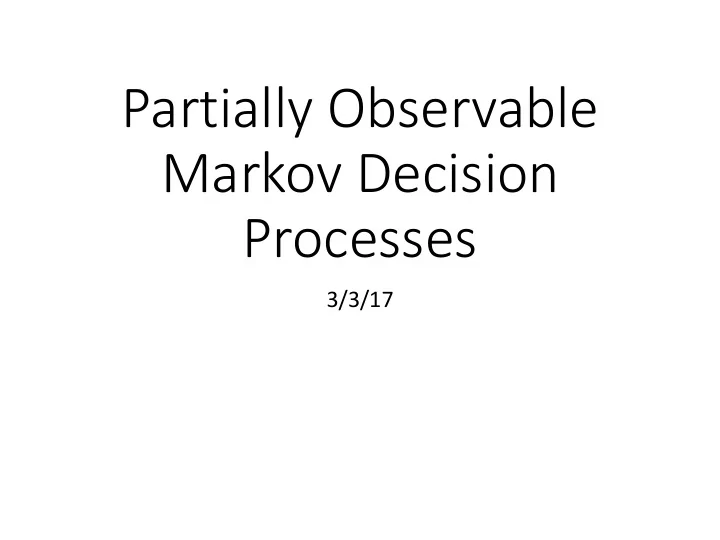

Partially Observable Markov Decision Processes 3/3/17
(Dis)Advantages of Online MCTS + Just like in game playing, MCTS handles high branching factors very well. + No training phase is required. − Each move takes a long time. − We’re back to an un-factored MDP, so we can’t directly do approximate Q-learning. + Online MCTS and function approximation can be combined. − That combination is beyond scope for this class. Discussion: compare online MCTS and approximate Q- learning. When should we prefer each?
Observability • The MDP model allows for noisy transitions. • It still assumes the agent always knows everything relevant about the world. • The agent can always tell exactly what sate it’s in. What if there are features of the environment that are definitely relevant to decision making, but aren't directly observable to the agent? • Name some environments where this can happen.
MDPs vs POMDPs In an MDP, the agent always knows its state. In a PO MDP, the state is partially observable . The agent believes some probability distribution over what state it’s in. eg: P(S 0 , S 1 , S 2 ) = 〈 0.45, 0.55, 0.0 〉
Optimal Policy in a POMDP In an MDP, if we know the value of every state, the optimal policy picks the best action in expectation: In a POMDP, we need to extend the EV calculation to our uncertainty over states: transition belief probability
Exercise: compute action EVs R(s0, a0) = 0 R(s0, a1) = 1 R(s1, a0) = 2 R(s1, a1) = -1 P(s0) = .25 P(s1) = .75 V(s2) = 3 V(s3) = 4
Updating Beliefs • The agent may get observations that change its beliefs about the probability of each state. • For example, if we see a the blue ghost down a corridor, all states where the blue ghost is elsewhere now have probability 0. • Each step, the agent gets an observation and updates its beliefs.
Exercise: what is the belief distribution? Initial distribution: 〈 0.4, 0.3, 0.3 〉 Action: a0 Observation: not in S 1
Converting POMDPs to MDPs In a POMDP: • Action + observation updates beliefs • Value is a function of beliefs. Instead we can view this as an MDP where: • There is a state for every possible belief. • Beliefs are probabilities, so we have a continuum. • There are infinitely many belief-states. • Taking an action transitions to another belief-state. • Observations are random, so this transition is random.
Value Iteration in POMDPs Value iteration in a finite MDP: 1. Initialize each state’s value to 0. 2. Compute the greedy policy for each state. 3. Update the value of each state based on this policy. 4. Goto step 2; repeat until converged. In a POMDP, there are infinitely many states. • We can’t loop through them. • Value is a piecewise-linear function of belief. • We can do value iteration over a finite set of linear functions. • This algorithm is described in the optional reading.
Connect Four Tournament Semifinal with w=7, h=6, c=4, t=5: jye1/dboshko1-tfeldma1: 0-2-0 Rank names wins draws slim1-tchen2/swallac3-nhoang1: 1-1-0 1 dboshko1-tfeldma1 114 7 jye1/swallac3-nhoang1: 1-1-0 2 slim1-tchen2 102 2 jye1/slim1-tchen2: 1-1-0 3 jye1 98 7 dboshko1-tfeldma1/slim1-tchen2: 1-1-0 4 swallac3-nhoang1 100 0 dboshko1-tfeldma1/swallac3-nhoang1: 1-1-0 5 mparker3-mbaer1 90 5 6 apowell1-hyan1 86 5 Semifinal with w=8, h=8, c=4, t=10: 7 tkyaw1-lbrumga1 81 14 jye1/dboshko1-tfeldma1: 1-1-0 8 jhan2-schen3 81 3 dboshko1-tfeldma1/swallac3-nhoang1: 1-1-0 jye1/slim1-tchen2: 1-1-0 9 azhao2-sfischm1 80 4 jye1/swallac3-nhoang1: 1-1-0 10 smalawi1 75 12 slim1-tchen2/swallac3-nhoang1: 1-1-0 11 rhiggin1-nfeldba1 72 7 dboshko1-tfeldma1/slim1-tchen2: 1-1-0 12 swang5-zzhao1 70 7 13 dmin1-mriley1 67 7 Semifinal with w=11, h=11, c=5, t=90: 14 yhigash1-msong2 64 6 jye1/dboshko1-tfeldma1: 1-1-0 15 amansar1-cpillsb1 58 9 dboshko1-tfeldma1/swallac3-nhoang1: 0-2-0 16 jnovak1-twarner2 56 4 jye1/swallac3-nhoang1: 0-2-0 17 kyee1-bchen6 52 7 (slim1-tchen2: betterEval requires c=4) 18 eliu2-itang1 52 0 19 aabitin1-lceball1 20 0 Semifinalists vs. Bryce: 20 asiegel1-jshah1 15 0 jye1/bryce: 0-2-0 21 gbarret1-zliu1 10 0 dboshko1-tfeldma1/bryce: 1-1-0 22 jlee5 10 0 swallac3-nhoang1/bryce: 1-1-0 23 dholmgr1-cllop1 8 0 slim1-tchen2/bryce: 0-2-0
Recommend
More recommend